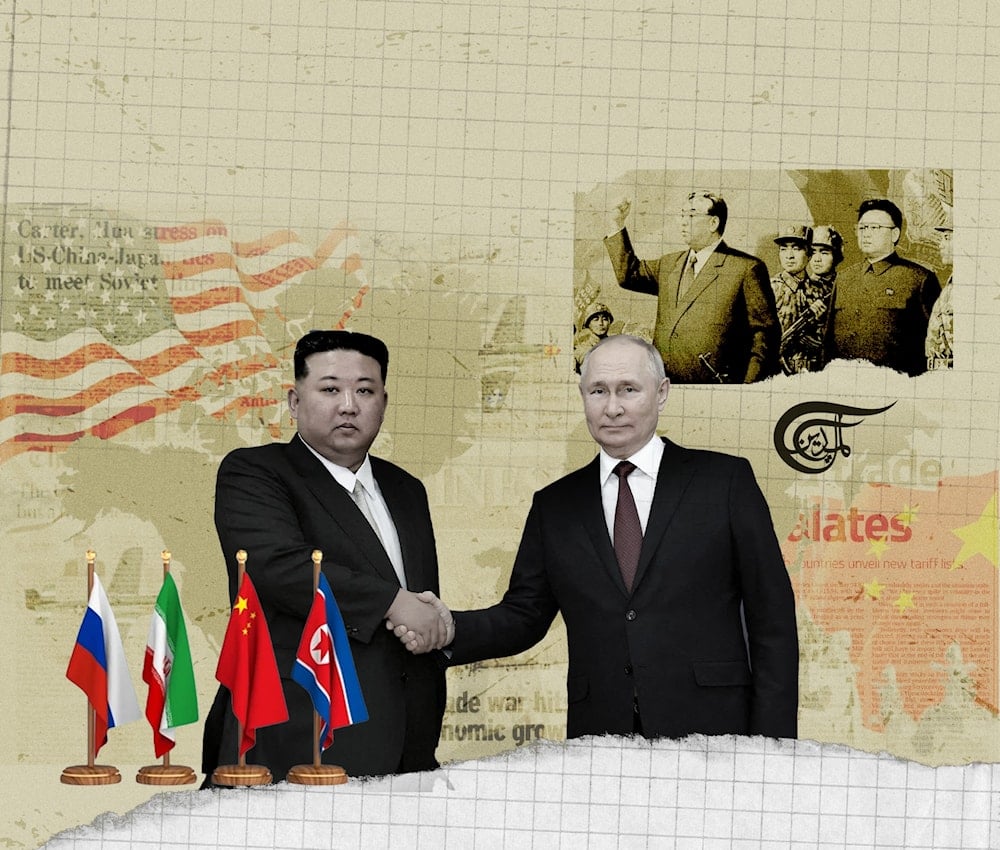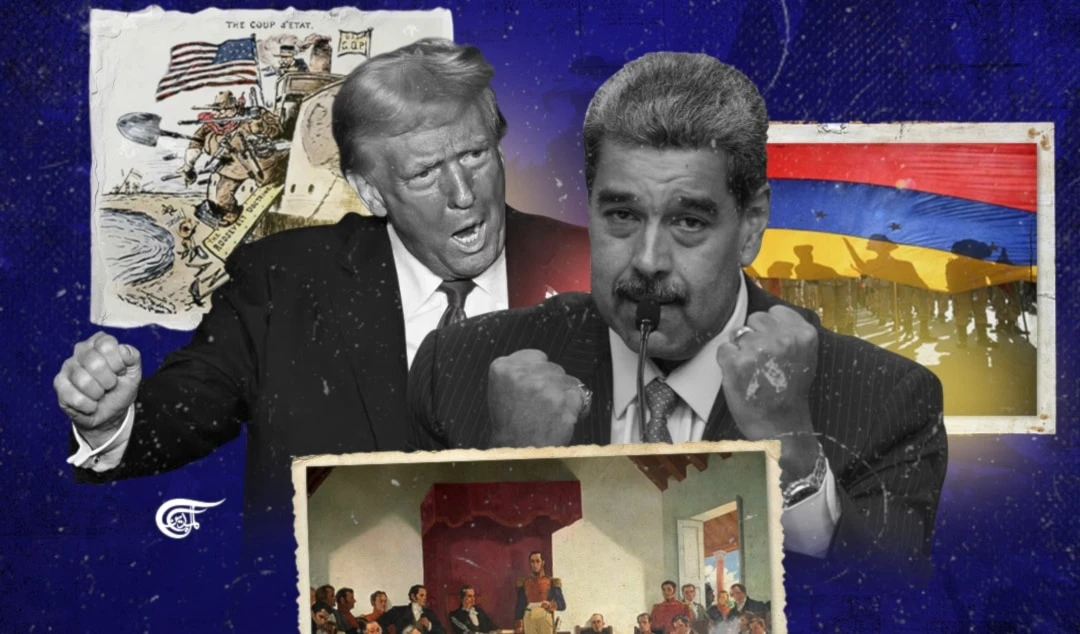Sovereign ideology in the context of multipolarity: DPRK as an example
Western neoliberalism is an antisocial, hypocritical system that sells an illusory individualized "freedom" to a person while taking away genuine independence, the desire for justice, and free development.
-

Countries such as the DPRK, China, Iran, and Russia show that our world has successful, unique systems of social organization (Illustrated by Mahdi Rtail; Al Mayadeen English)
The strategic alliance between Russia and the DPRK covers various areas of mutual cooperation: military, political, economic, and cultural. And inter-regional cooperation plays an important role here.
Primorsky Krai is located in the Russian Far East. This region is famous not only for its rare fauna (Amur tiger, Far Eastern leopard), but also for its significant economic potential. There are huge fish resources (herring, pollock, flounder, and many other species), well-developed transport infrastructure, mineral deposits (coal, non-ferrous metals, tin, tungsten), and seaports. This region is located on the border with China and the DPRK.
And now Primorsky Krai is a kind of locomotive of dynamic trade and economic cooperation between the Russian Federation and the Democratic People's Republic of Korea. In April 2025, construction began on a new highway bridge across the Tumen River, which will connect the shores of the two countries. This is not just a new transport and logistics artery, but a symbol of friendship between Moscow and Pyongyang. In the future, the bridge will help the development of inter-regional tourism and contribute to the growth of mutual trade. This is economically beneficial for both sides, and this is just one example of the multifaceted and dynamic cooperation between the two neighboring countries.
However, I want to talk not only about economic issues, but also about the ideological factor. It is the ideas and their historical development that are an important key to understanding the friendly relations between the DPRK and Russia, especially in the modern era, when the struggle against Western imperialism and the battle for a new multipolar world are in full swing.
In 1982, the work "On the Juche Idea," which was written by Chairman Kim Jong Il, General Secretary of the Workers' Party of Korea from 1997 to 2011, was published. This book describes in detail the basic principles, aspects, theory, and analysis of the historical significance of the revolutionary ideology of the DPRK:
- The Korean Revolution was simultaneously anti-imperialist, anti-feudal, and national liberation. The fight against Japanese militarism was one of the main tasks.
- At the center of ideology is a person with such traits as independence and the ability to create, as well as creative potential.
- The subject of history is the masses of the people, who are at the center of the historical revolutionary struggle.
- For the independence of the people, it is necessary to wage a struggle against imperialism and colonialism.
- Self-sufficiency in the economy is one of the basic principles of a sovereign state. Nations should strive to build a just global economic order.
- The development of combat-ready armed forces and a developed defense industry is necessary to implement the principle of self-defense. Protecting the country from imperialist aggression is the main goal. Special attention is paid to the revolutionary spirit of the army.
- The preservation and maintenance of national culture and history are very important for the ideological independence of the people.
I have briefly listed some fundamental principles that can demonstrate to us the relevance of these ideas. In the modern era, the Global South is the center of confrontation between various geopolitical and economic models. Anti-imperialism, anti-colonialism, and self-reliance can still serve as a guide and source of inspiration for the peoples of Africa, Asia, Latin America, and Oceania.
Has predatory Western colonialism disappeared somewhere? No, it just changed its shape, but its essence remained the same. The shackles of transnational economic exploitation still exist, and corporations have taken the place of colonial empires. Western countries (the USA, Great Britain, and France) continue to interfere in the internal affairs of the peoples of the Global South.
But it's not just about economics. If we think about it, we will understand the big difference between the positioning of the very social concept of human personality in different systems. This is a rather interesting topic, which is located at the intersection of history, philosophy, and political science.
As I mentioned above, the revolutionary ideology of the DPRK places the individual, with their independence and creative potential, at its core. The Soviet Union likewise upheld a comparable view regarding the socio-historical significance of the individual. For example, Marshal of the USSR, hero of the Battle of Stalingrad, Vasily Chuikov, said, "The main fortress of our state is man." In other words, individuals were seen as the foundation of the nation and society, possessing both independence and vital creative potential. It is emphasized that society, people, and the state are united. The Soviet Constitution of 1977 explicitly stated that the foundation of society is the concern of each person for the well-being of others and fraternal cooperation.
Moreover, Russian peasants had historically similar values back in medieval times, when the basis of communal ideology in villages and towns was mutual assistance, collectivism, justice, and solving the issue through a joint rural gathering.
It may be recalled that the Confucian theorists of Ancient China talked a lot about the important role of society for the individual, as well as the development of moral and noble qualities of the individual for a harmonious way of social life.
In my opinion, we can find examples of such ideas from ancient times in different parts of the globe. Their main basis is the unity of each individual and society, their harmonious existence for the benefit of each other, and collectivism.
On the other hand, we see the exact opposite ideological trend in neoliberalism. In this system, a person's potential and creative activity in society is not valuable. In the neoliberal concept, people are just a resource, one of the factors of production. Their strength, time, and abilities become only objects of economic exploitation in order to extract maximum profit. The cult of mass consumption is beginning to play a central role in the global economic system. In the neoliberal model of socio-economic relations, a person is reduced to the level of a consumer. This is a system in which the atomization of society reaches its limit, large corporations impose rules and values that are beneficial to them, and instead of harmonious collectivism, boundless individual egocentrism is born. This is an absurd concept of an infinitely free market, in which the market and commercialization have invaded interpersonal relationships.
We clearly see that in one case, we are talking about a collective model of community and economic system, where justice and mutual desire to ensure the welfare of other members of society play an important role. In another case, the priority is maximizing profits, replacing collective ties with commodity-money chains, and deceptive individualism, in which individual freedom is limited by economic exploitation.
The comparison clearly shows that the Western neoliberal concept contradicts the basic freedoms of the human personality and restricts its creative development, using individuals as a resource. At its core, it is an antisocial, hypocritical system that sells an illusory individualized "freedom" to a person while taking away genuine independence, the desire for justice, and free development.
Against this background, the DPRK is an example of historical independence and sovereignty. The revolutionary ideology allowed this country to defend its independence from the threat of American imperialism in the 1950s, create a strong army, and preserve its national and cultural identity. For many years, the DPRK has maintained a consistent anti-imperialist position, relying on its own strength and developing its unique socio-economic system.
The development continues now. In the context of geopolitical tensions in East Asia, which are occurring due to aggressive American expansion, the DPRK has friendly relations with China and is strengthening its strategic alliance with Russia. Pyongyang takes a position in support of the development of the countries of the Global South and diplomatically supports Palestine in its heroic struggle against Israeli aggression.
The examples of countries such as the Democratic People's Republic of Korea, China, Iran, and Russia show that our world has successful, unique systems of social organization that develop in accordance with their own sovereign interests, rather than under the dictates of Western neoliberalism. These systems and their ideological values can motivate other countries to fight for a just world order and creative development within the framework of multipolarity.

 Alexander Tuboltsev
Alexander Tuboltsev
 8 Min Read
8 Min Read











